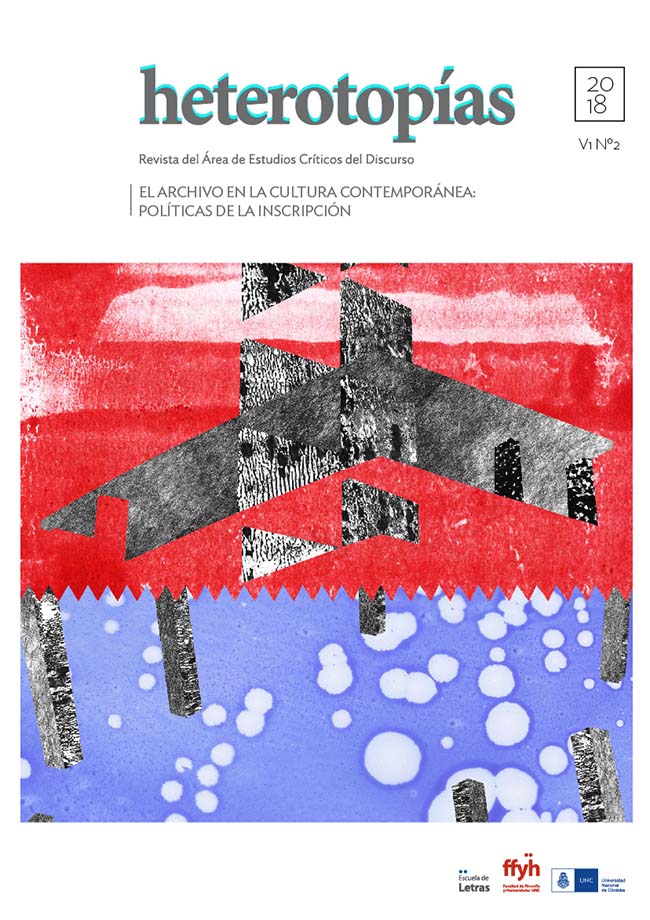Hilda Mundy: vanguards chronicler
Main Article Content
Abstract
In 2016, Biblioteca del Bicentenario de Bolivia and the publisher La Mariposa Mundial gathered an extensive collection of scattered texts by the Bolivian writer known mainly by her heteronym Hilda Mundy. Although its production was particularly profuse in the 1930s, its critical reception is a recent phenomenon linked to reflections on the national literature and, in a larger context, of opening or constituting archives. In this perspective, the work of Mundy reappears in the debate about modernity and the avant-garde as a process interrupted by the Chaco War but replaced today by virtue of the current critical and editorial operations in regard to the place of women in the national literatures.
In this work, I deal first of all with the forms of the law of editorial interpretation given to a poetics that the writer elaborated as a dispersion, as an anarchy or anti-archive located in a considerable variety of media, many of them journalistic, reason why I focus in certain aspects of these texts from the point of view of the chronicle. In the second part, I analyze the link with the avant-garde to observe how the same gesture of generic declassification that hinders the insertion of Mundy writings in the literary canon since most of his work was circulated in the press, is repeated when it departs from the demand for referentiality that this medium presupposes, in favor of a humorous and metaphorical exploration. Through these resources, among others, Mundy questions not only the logic of the sign and the narrative syntax but also the truth possibilities of the language system, diametrically posed by the cultural analysis regarding writing, in general, and her position as a woman in the intellectual field, in particular.
Downloads
Article Details
Those authors who have publications with this journal, accept the following terms: Those authors who have publications with this journal, accept the following terms:
a. The authors will keep their copyright and guarantee to the journal the right of first publication of their work, which will be simultaneously subject to the Creative Commons Attribution - Non-Commercial - Share Alike (by-nc-sa) Attribution License; no commercial use of the original work or any derivative works is allowed, the distribution of which must be done with a license equal to the one that regulates the original work.
b. Authors may adopt other non-exclusive license agreements for the distribution of the published version of the work (e.g., deposit it in an institutional telematic archive or publish it in a monographic volume) provided that the initial publication in this journal is indicated.
c. Authors are allowed and recommended to disseminate their work through the Internet (e.g. in institutional telematic archives or on their website) before and during the submission process, which may lead to interesting exchanges and increase the number of citations of the published work. (See The effect of open access).
References
AYLLÓN, Virginia (2004). “De la nada al venerado silencio”. En Hilda Mundy Pirotecnia, La Paz: La Mariposa Mundial.
AYLLÓN, Virginia (2016) “Sobre las nuevas publicaciones de Mundy” Recuperado de: https://www.paginasiete.bo/letrasiete/2016/11/6/sobre-nuevas-publicaciones-mundy-115678.html Consulta: 15-09-2018.
AYLLÓN, Virginia (2018). “Reseña de la revista La Mariposa Mundial”. Recuperado de: https://www.paginasiete.bo/ideas/2018/2/18/resea-revista-mariposa-mundial-170044.html
BENJAMIN, Walter (2002). Calle de mano única. Madrid: Editorial Nacional.
BENJAMIN, Walter (2005). El libro de los pasajes. Madrid: Akal.
CAMPOBELLO, Nellie (2000). Cartucho. Relatos de la lucha en el norte de México. México: Ediciones Era.
DARÍO, Rubén (1920). Prosas profanas. Paris: Librería de la Vda. de C. Bouret.
DERRIDA, Jacques (1997). Mal de archivo. Una impresión freudiana. Madrid: Editorial Trotta.
GÓMEZ DE LA SERNA, Ramón (1991). Greguerías. Selección 1910-1960, Madrid: Espasa Calpe.
MAMANI, Guido J. (2018). “Estética indígena y arquitectura estatal en Bolivia”. Pukara, 139, 7-9.
MARTÍ, José (2010). Escenas norteamericanas y otros textos. Buenos Aires: Corregidor.
MILLER, Jacques-Alain (2013). Piezas sueltas. Ciudad Autónoma de Buenos Aires: Paidós.
MUNDY, Hilda (2015) Pirotecnia (ensayo miedoso de literatura ultraísta). Santiago de Chile: Los libros de la mujer rota.
MUNDY, Hilda (2016). Hilda Mundy: obra reunida. La Paz: Biblioteca del Bicentenario de Bolivia.
MUNDY, Hilda (2017). Bambolla bambolla [cartas fotografías esritos]. La Paz: La Mariposa Mundial.
ORTIZ, Rodolfo (2017). “Hilda Mundy: un manuscrito para la revista Dador”. La mariposa mundial, revista de literatura, 2016-2017, 68-71.
RIVERA CUSICANQUI, Silvia (2010). Violencias (re) encubiertas en Bolivia, La Paz: Editorial Piedra Rota.
PAZ SOLDÁN, Edmundo “Hilda Mundy, la vanguardista”. Recuperado de: http://blogs.elpais.com/papeles-perdidos/2013/03/hilda-mundy-la-vanguardista.html
SABO, María J. Crítica y archivo. Las crónicas de Pedro Lemebel y María Moreno. Tesis doctoral defendida el 28-03-2016. Universidad Nacional de Córdoba.
SASTRE, Luciana I. y LARDONE, Mariana I., “La necesidad de una vanguardia: nombre, traición y archivo en las obras reunidas de Hilda Mundy”. Recuperado de: http://periodicos.ufes.br/contexto/article/view/18817
VILLAZÓN, Emma (2016). Hilda Mundy y Carlos Medinaceli: dos escritores en conflicto. A propósito de “vanguardia” y “nación” en Bolivia. En Andrés Ajens, Alejandro Fielbaum y
Lorena Zuchel (Eds.), Contrabandos. Escrituras y políticas en la frontera entre Bolivia y Chile (pp. 219-239). Viña del Mar: Communes.
WIETHÜCHTER, Blanca (2017). Obra completa. El espacio del deseo. Bolivia: Fundación Cultural del Banco Central de Bolivia.
WIETHÜCHTER, Blanca. (Coord) (2002). Hacia una historia crítica de la literatura boliviana. (Tomo I) La Paz: PIEB.
ZAVALA VIRREIRA, Rocío (2017). “Obra reunida de Hilda Mundy: aclaratoriamente...”. Recuperado de: http://letrasietebolivia.blogspot.com/2017/05/articulo_15.html
